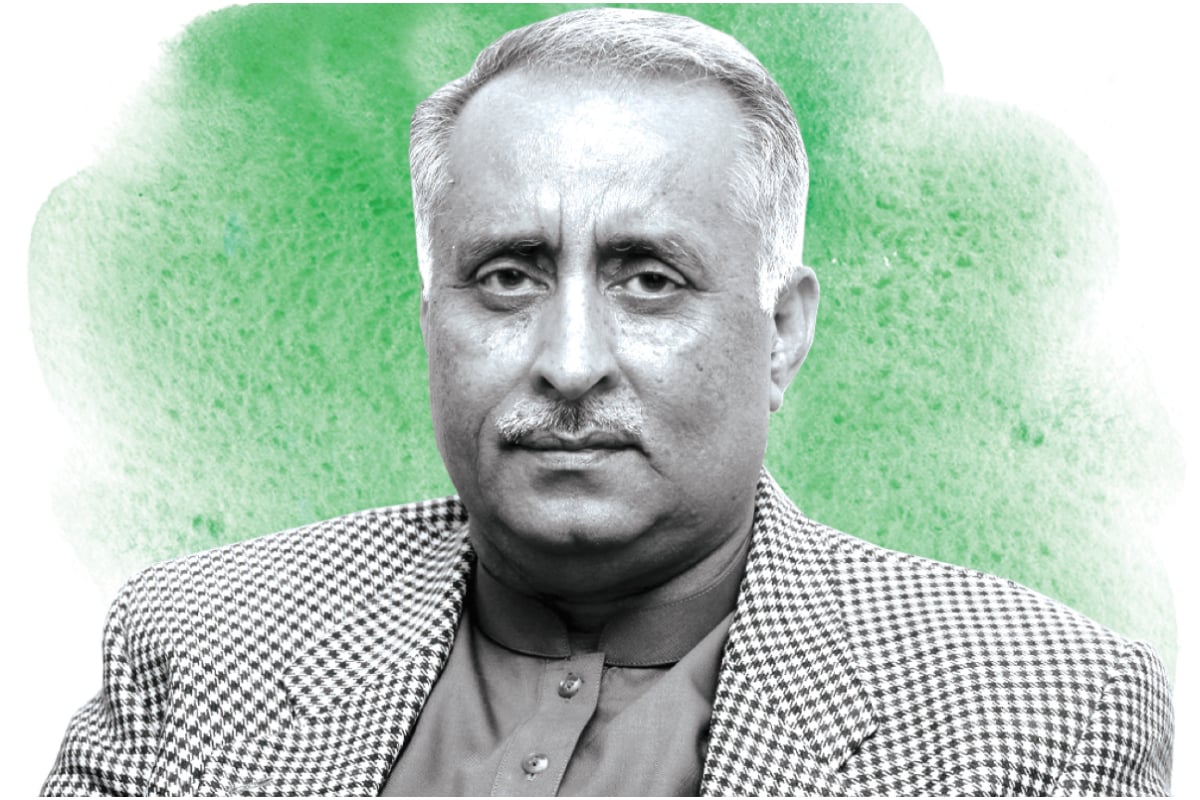
‘People are standing in queues to get flour’
Khalid Mahmood Khokhar
President of Pakistan Kissan Ittehad
“Food security is at stake due to the indifferent attitude of successive governments towards the agriculture sector,” said the President of Pakistan, Kissan Ittehad Khalid Mahmood Khokhar.
“People are standing in queues to get flour. Farmers are doing the same thing right now to obtain urea fertiliser for application on standing wheat crops,” he said, adding that it was not the first time and would not be the last. “We are not ready to learn from our past mistakes. Instead, we are committing the same mistakes time and again for decades. The end result is the destruction of the agricultural sector. Wheat production will be even lower than last year, and as such, the crisis will be more severe,” Khokhar said while talking to Bol News.
Referring to the prevailing flour crisis, he maintained that it was due to delays in placing import orders and the government’s failure to check smuggling of the essential commodity to the neighbouring countries. “Wheat production was less than the required quantity last year. Some stock was also lost due to floods. The high price of wheat on the international market also led to smuggling, which put additional stress on the existing stocks. It was up to the government to check smuggling and import wheat in the required quantity,” he said, adding: “The hapless farmers sold wheat at a support price of Rs 2200 per maund, which is now available at Rs 5200 per maund.”
He predicted an even worse scenario for next year due to wheat cultivation on less land and high DAP prices, which led to less application.
“DAP has not been applied in the required quantity due to high prices,” he said.
“Now urea is also short due to the closure of two plants. To avoid further reductions in wheat yield, the government should ensure the availability of urea to farmers at lower prices, according to Khokhar, who suggested that the Punjab and Khyber Pakhtunkhwa governments raise the wheat support price to Rs 4000 per metric tonne, as the Sindh government has done.
“It will encourage farmers to spend more on the standing crop in the form of fertiliser application. Any further delay in announcing a new support price will only reduce the wheat yield,” said Pakistan’s President, Kissan Ittehad.
Moreover, he maintained that the support price for wheat should be higher or equal to international prices, as this would prevent smuggling
“We are not ready to give due return to our own farmers.” Instead, we prefer to pay the farmers of other countries by importing wheat. Moreover, some spending on our own farmers could help reduce foreign exchange spending on the import of agricultural products.
Khokhar, according to Bol News, is a progressive farmer who owns 40 acres of land in Kabirwala, district Khanewal. He has also acquired 700 acres on lease for cultivating cotton, wheat, rice, vegetables, and mangoes. He is getting 30 to 40 percent higher yields of crops as compared to the national averages by using quality inputs and adopting better farming practices.
He is a member of various federal and provincial government committees, like the Committee on Agriculture Development, the Punjab Agri Research Board, and the Cotton Research and Development Board. The Pakistan Kissan Ittehad is the biggest farmer association in the country. Starting from a small movement, it is now the voice of millions of small farmers. It is regularly arranging seminars to motivate farmers to cultivate cotton, the crop that contributes around 60 percent to the national GDP and provides livelihoods to around 20 million small farmers in Pakistan.
Following are excerpts from an exclusive talk with him:
How do you see the prevailing wheat crisis, and what is the future scenario? What should the way forward be?
Khalid Mahmood Khokhar (KMK): The country is facing a wheat crisis right now due to the indifferent attitude of the government towards the agriculture sector, the smuggling of the commodity, and the delay in placing import orders. The same is likely to happen next year, and that too with even more intensity, as the prolonged inundation of floodwater and delay in revising the support price have affected wheat sowing. Moreover, high prices of DAP at the time of sowing and the current shortage of urea will lead to low crop yields. As such, wheat production will be lower as compared with last year, which means we will need to import the commodity to fulfil domestic needs. The way forward is to revise wheat support to Rs 4,000 per metric tonne to encourage growers to spend more on applying fertiliser. It will also help control smuggling as local prices will be close to those on the international market. The government should make all urea manufacturing factories functional to ensure the availability of important inputs at retail prices. To avoid the wheat crisis this year, the government should take a timely decision to import the required quantity after assessing the actual production.
What are the challenges faced by the agriculture sector?
KMK: There is an issue of low productivity and quality due to the affordability of inputs, which include raw materials, advanced technologies, information, and advisory and financial services. We are fast losing agricultural land to housing societies. The only pragmatic approach is to ensure the availability of enough agricultural land and to take measures to increase yields in order to feed an expanding population. The farmers could get a higher yield by using certified seeds, quality inputs, and best farming practices. The government should focus research on developing high-yield seed varieties for wheat, rice, cotton, and other crops. The government is now talking about the imposition of GST on DAP fertiliser. It will prove disastrous for the agriculture sector. The government should withdraw the decision to impose GST on agricultural electricity tariffs. The conventional crops continue to dominate the sector, with a slow pace of diversification towards fruits, vegetables, flowers, oilseeds, pulses, beans, and grains. The prevailing scenario is forcing an agrarian country like Pakistan to import a number of food items. We must draw a line in the sand to save enough agricultural land to ensure our food security. Then the only pragmatic approach can be to take measures to enhance yield, feed an increasing population, and increase exports.
Your take on the impacts of climate change on agriculture and possible ways forward?
KMK: Climate change has emerged as the most serious issue, which is making our rainfall patterns erratic. We are not sure when we’ll have rainfall or drought, which is affecting our sowing season and impacting agriculture. There is a need to make our agriculture and water sectors more resilient to the impacts of climate change. Mitigation and adaptation should occur concurrently to achieve the desired results. We need to increase green cover and build dams. We need to focus research on introducing heat- and drought-resistant and water-efficient varieties.
What is the impact of the recent surge in fuel prices and electricity tariffs on the agriculture sector?
KMK: The increase in fuel prices has considerably enhanced the input cost, as the majority of the farmers use diesel-fired engines for extracting groundwater for irrigation purposes. High electricity tariffs and fuel prices have increased inflation and, as a result, the prices of inputs like seeds, fertilisers, pesticides, and agriculture machinery. The prevailing scenario has made it really tough for the farmers to make ends meet while growing the next crop.
How have global inflation, high freight charges, and rupee depreciation affected the agriculture sector?
KMK: Inflation, high freight, and rupee depreciation have enhanced the landing cost of imported agriculture inputs and machinery. Prices of seeds, fertilisers, and pesticides have increased considerably. The increase in input costs is much higher than the price of produce. Now it is really tough for the growers to make ends meet. The government should come forward and help the hapless growers come out of the prevailing tough situation. It is a must for achieving food security in the days to come.
The trade deficit is a major issue. Can the agriculture and livestock sectors help overcome the prevailing crises?
KMK: It is a big challenge, as we rely on imports to fulfil our energy and food needs. There are enormous opportunities to substitute imports of oilseed, pulses, beans, and grains through promoting cultivation and the use of modern technology. Through diversification and investment in value-added products, Pakistan can increase exports of fruits, vegetables, and processed food items. The government should identify areas and encourage the sowing of palm oil, sunflowers, and other oilseeds to save precious foreign exchange in the days to come. A large portion of milk is wasted due to a lack of awareness and the lack of necessary infrastructure. Technical and financial support for small farmers can help minimise milk wastage in rural areas. Processed milk and value-added milk products can help earn good foreign exchange for the country.
How can we rationalise our energy mix?
KMK: Our energy mix is not sustainable due to our heavy reliance on imported fossil fuels for power generation. Pakistan has an abundance of natural resources such as water, solar, and wind. We have the potential to generate enough electricity through hydroelectric resources alone to easily fulfil our growth requirements for the next two to three decades. Hence, there is a need to build dams to fulfil our future irrigation and power generation requirements.
Catch all the National Nerve News, Breaking News Event and Latest News Updates on The BOL News
Download The BOL News App to get the Daily News Update & Live News.












 Read the complete story text.
Read the complete story text. Listen to audio of the story.
Listen to audio of the story.